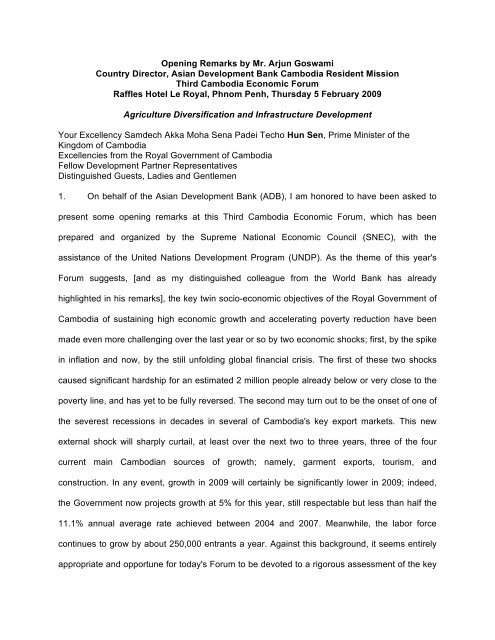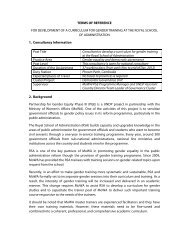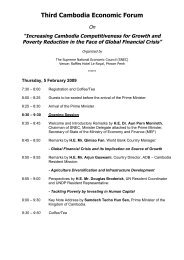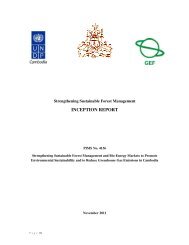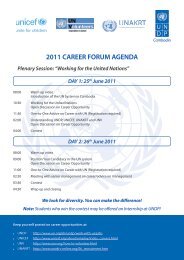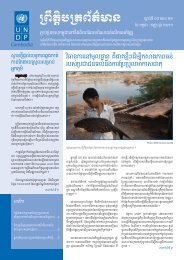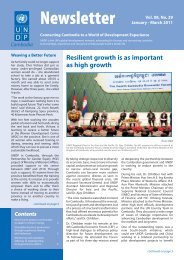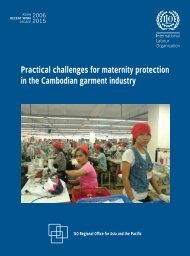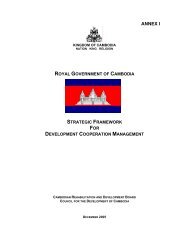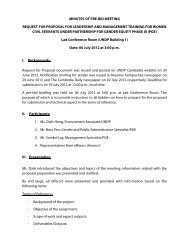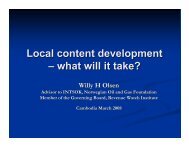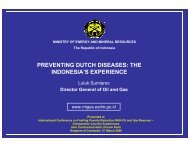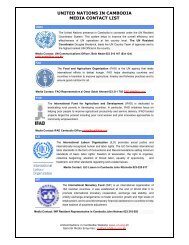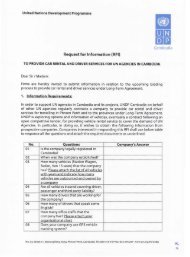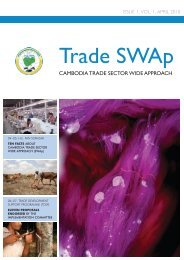Opening Remarks by Mr. Arjun Goswami Country Director, Asian ...
Opening Remarks by Mr. Arjun Goswami Country Director, Asian ...
Opening Remarks by Mr. Arjun Goswami Country Director, Asian ...
Create successful ePaper yourself
Turn your PDF publications into a flip-book with our unique Google optimized e-Paper software.
<strong>Opening</strong> <strong>Remarks</strong> <strong>by</strong> <strong>Mr</strong>. <strong>Arjun</strong> <strong>Goswami</strong><br />
<strong>Country</strong> <strong>Director</strong>, <strong>Asian</strong> Development Bank Cambodia Resident Mission<br />
Third Cambodia Economic Forum<br />
Raffles Hotel Le Royal, Phnom Penh, Thursday 5 February 2009<br />
Agriculture Diversification and Infrastructure Development<br />
Your Excellency Samdech Akka Moha Sena Padei Techo Hun Sen, Prime Minister of the<br />
Kingdom of Cambodia<br />
Excellencies from the Royal Government of Cambodia<br />
Fellow Development Partner Representatives<br />
Distinguished Guests, Ladies and Gentlemen<br />
1. On behalf of the <strong>Asian</strong> Development Bank (ADB), I am honored to have been asked to<br />
present some opening remarks at this Third Cambodia Economic Forum, which has been<br />
prepared and organized <strong>by</strong> the Supreme National Economic Council (SNEC), with the<br />
assistance of the United Nations Development Program (UNDP). As the theme of this year's<br />
Forum suggests, [and as my distinguished colleague from the World Bank has already<br />
highlighted in his remarks], the key twin socio-economic objectives of the Royal Government of<br />
Cambodia of sustaining high economic growth and accelerating poverty reduction have been<br />
made even more challenging over the last year or so <strong>by</strong> two economic shocks; first, <strong>by</strong> the spike<br />
in inflation and now, <strong>by</strong> the still unfolding global financial crisis. The first of these two shocks<br />
caused significant hardship for an estimated 2 million people already below or very close to the<br />
poverty line, and has yet to be fully reversed. The second may turn out to be the onset of one of<br />
the severest recessions in decades in several of Cambodia's key export markets. This new<br />
external shock will sharply curtail, at least over the next two to three years, three of the four<br />
current main Cambodian sources of growth; namely, garment exports, tourism, and<br />
construction. In any event, growth in 2009 will certainly be significantly lower in 2009; indeed,<br />
the Government now projects growth at 5% for this year, still respectable but less than half the<br />
11.1% annual average rate achieved between 2004 and 2007. Meanwhile, the labor force<br />
continues to grow <strong>by</strong> about 250,000 entrants a year. Against this background, it seems entirely<br />
appropriate and opportune for today's Forum to be devoted to a rigorous assessment of the key
vulnerabilities of the economy to external shocks to help pinpoint and focus on the priorities<br />
which need to be addressed.<br />
2. One clear priority, which the Royal Government is surely right to emphasize, as it has in<br />
the recently launched Phase 2 of the Rectangular Strategy, is accelerating agricultural<br />
diversification and infrastructure development. The ADB supports this for three reasons. First, it<br />
will help mitigate the adverse social consequences of inflation and slowing growth <strong>by</strong> linking<br />
farmers to markets, moving up value chains, and widening the geographical reach of, and social<br />
participation in, the growth process. This more socially-inclusive growth will not only help sustain<br />
economic growth and make it more equitable and pro-poor, but also help strengthen the<br />
underlying grass-roots support on which the inclusive growth process depends, as well as<br />
complement and reinforce the Royal Government’s laudable initiatives towards decentralization<br />
and deconcentration. Second, in terms of mitigating macroeconomic vulnerability to inflation, the<br />
events of 2008 related to food price inflation have clearly confirmed that there is a need to<br />
promptly relieve the underlying structural constraints that contributed to the spike in headline<br />
inflation (as we will learn from the presentation on “Explaining Inflation in Cambodia” this<br />
afternoon), including <strong>by</strong> improving rice storage capacity and distribution mechanisms, and<br />
increasing the supply of other domestically-produced food items, including chicken, pork, and<br />
fish. While food price inflation is now on a declining path, as indeed is the headline rate, the<br />
potential for renewed bouts of food price-generated inflation will remain until supply and<br />
distribution bottlenecks are eased. Third, as highlighted during the Second Economic Forum in<br />
May 2007 and confirmed since <strong>by</strong> several studies, including an ongoing analysis <strong>by</strong> the ADB,<br />
there is now a clear and broad consensus that agricultural output could be much less volatile<br />
and higher, at least over the medium-term. This would require higher public and private<br />
investment in the sector and improvements in the coordination and implementation of the<br />
Strategy on Agriculture and Water, 2006-2010, including with respect to land tenure security,<br />
irrigation and drainage, fertilizer and seed use, technology, extension services, and access to<br />
2
finance, while improvements in natural resource management could result in higher sustainable<br />
outputs from fishery, forestry, and livestock activities. These improvements alone would go a<br />
long way to diversifying the sources of growth from the agricultural sector and there<strong>by</strong> help<br />
generate higher rural incomes. Assuming favorable climactic conditions, it is hoped that<br />
agricultural output will receive a welcome boost from the stimulus measures taken last year in<br />
response to the domestic food price hike.<br />
3. While higher agricultural sector output may be necessary, it would not be sufficient for<br />
sustaining the growth and poverty reduction dynamics in Cambodia. Indeed, rural development<br />
and poverty reduction will also require measures to: (i) support the creation of adequate nonfarm<br />
livelihood and employment opportunities in rural areas, including through the creation and<br />
growth of micro and small and medium enterprises; (ii) extend social infrastructure, such as<br />
rural education and vocational training, in terms of quality as well as quantity; and (iii) provide<br />
key physical infrastructure, including rural water supply and sanitation, rural roads, including<br />
maintenance and linkages to the provincial, national, and developing subregional networks, and<br />
rural electrification. In summary, rural development in Cambodia is not merely about agricultural<br />
sector performance, important as it is, but about the effective coordination of multi-sector issues<br />
and indeed strategies in terms of a sensibly integrated rural development approach.<br />
Your Excellency Samdech Hun Sen<br />
Excellencies from the Royal Government of Cambodia<br />
Distinguished Guests, Ladies and Gentlemen<br />
4. Let me conclude my opening remarks <strong>by</strong> thanking all those who have organized today's<br />
important event, especially the SNEC which has been not only the main driving force behind<br />
today's impressive line-up and stimulating agenda, but is also increasingly establishing its<br />
credentials as a top-notch policy advisor to the Royal Government. I very much look forward to<br />
today's discussions and doing whatever I can, as <strong>Country</strong> <strong>Director</strong> of the ADB in Cambodia, to<br />
assisting the Royal Government in reducing poverty and improving the lives and prospects of<br />
ordinary Cambodians.<br />
3


